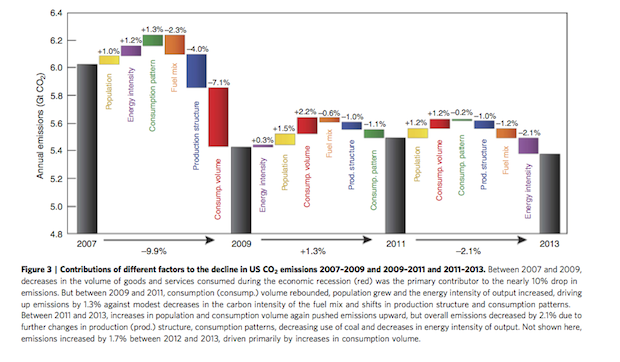Surprising ecological upside to the economic downturn
Energy Secretary Ernest Moniz is fond of suggesting the natural gas boom has helped the United States combat climate change.
But a new study calls that premise into question, suggesting it was the economic downturn, not cleaner burning fuels, which helped the United States reduce its greenhouse gas emissions.
The study, published in Nature Communications on Tuesday, found that from 2007 to 2013 carbon dioxide emissions from fossil fuels dropped by about 11 percent. During the Great Recession, from 2007 to 2009, the researchers found, 83 percent of the decline in emissions was the result of decreased consumption of goods and services.
Only the remaining 17 percent during that period was due to shifts away from fossil fuels like coal and oil and into natural gas due to the boom in hydraulic fracking.
And even when the economy began to pick up from 2009 through 2013, the study, led by University of Maryland's Klaus Hubacek, found that it was the high price of gasoline, mild winters and more energy efficient manufacturers that have kept emissions in check. There was a decline of 1.1 percent from 2009 to 2011 and a 0.2 percent decline from 2011 to 2013.
"High gasoline prices during 2011-2013 have contributed to both a reduction in per capita miles driven and an increase in average fuel efficiency of vehicles, and thus a 33 percent decrease in US gasoline consumption during 2011-2013," the authors wrote. "Second, a mild winter in 2012 meant less energy was used for heating and thus reduced energy intensity of the service sector. Last, there is evidence that manufacturing in the United States became more energy efficient: energy use by manufacturing was nearly constant 2011-2013 despite average annual growth in GDP of 2.3 percent per year over the same period."
The authors contend the findings should be seen as a cautionary note to those who envision natural gas being central to any future climate policy in the United States and elsewhere.
President Obama has repeatedly warned about the perils of climate change and announced that the U.S. wants to reduce emissions by 26 percent to 28 percent by 2025, compared with 2005 levels. Earlier in his presidency, he set a goal to cut emissions by 17 percent by 2020.
Along with a goal of doubling fuel efficiency of cars by 2025, the Environmental Protection Agency has proposed a Clean Power Plan that calls for reducing emissions from existing coal-fired power plants 30 percent by 2030.
Under the plan, states could choose how they would meet those standards with options including shifting their energy mix to include more natural gas.
"The modest effect of changes in the fuel mix of the energy sector on emissions in recent years suggests that further increase in the use of natural gas may be of limited benefit in decreasing emissions," the authors wrote, noting that the cheaper gas cannot replace coal and also could be a barrier to the expansion of renewables like solar and wind and inspire increased use of energy due to the lower prices.
"Sustaining economic growth while also drastically reducing emissions to the levels targeted by the Obama administration will depend upon large additional decreases in the energy intensity of the US economy as well as radical decarbonization of the energy sector," the authors wrote.
Robert N. Stavins, the Albert Pratt Professor of Business & Government at Harvard University's John F. Kennedy School of Government, disagreed with the assertion on the role natural gas played in the past and will play in the decades to come.
"Fuel switching from coal to natural gas contributed significantly to the fall in emissions, compared with what emissions would have been if there not been fuel switching," Stavins told CBS News.
"Natural gas has been and can continue to be an important bridge fuel in the electricity sector, while coal use declines and until renewable energy comes anywhere close to being capable of playing an important role quantitatively," Stavins said.
And even if much of the decline was due to recession, Stavins questioned how that could inform climate change policy in the future.
"If the study's methodology proves to be rigorous and reliable, the results would be interesting, but not revolutionary," he said. "The fact that emissions fell because of decreased economic activity is not particularly informative for public policy purposes, unless of course one thinks that retarding economic growth is a sensible climate policy."
